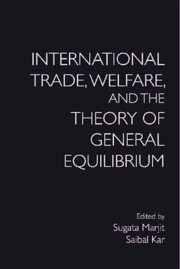Book contents
- Frontmatter
- Contents
- List of Figures and Tables
- Introduction
- 1 Thoughts and Remarks after 50 Years of Simple General Equilibrium Models
- 2 Adjustment Costs and Trade Liberalization
- 3 Farsightedly Stable FTA Structures: The Roles of Preexisting Tariff Rates
- 4 Skilled–Unskilled Wage Inequality and Dynamic Skill Accumulation: A Theoretical Analysis
- 5 FDI in Education vs FDI in Commodity Production: A Theoretical Model
- 6 Skilled Migration and Foreign Aid in a General Equilibrium Model of Monopolistic Competition
- 7 Trade, Factor Flows, and Product Variety in a Small Open Economy
- 8 Product Differentiation, Quality of Innovation, and Capital Mobility: A General Equilibrium Analysis
- 9 Cross-Border Mergers and International Trade: A Vertical GOLE Model
- 10 International Trade and Production Organization: A Review of Contemporary Literature
- 11 Negative Production Externalities, Labor Market Imperfection, and Production Tax Policy in a Developing Economy
- 12 Tax-Financed Public Transfers: A Mechanism for Double Taxation
- Contributors
- Index
6 - Skilled Migration and Foreign Aid in a General Equilibrium Model of Monopolistic Competition
Published online by Cambridge University Press: 01 November 2018
- Frontmatter
- Contents
- List of Figures and Tables
- Introduction
- 1 Thoughts and Remarks after 50 Years of Simple General Equilibrium Models
- 2 Adjustment Costs and Trade Liberalization
- 3 Farsightedly Stable FTA Structures: The Roles of Preexisting Tariff Rates
- 4 Skilled–Unskilled Wage Inequality and Dynamic Skill Accumulation: A Theoretical Analysis
- 5 FDI in Education vs FDI in Commodity Production: A Theoretical Model
- 6 Skilled Migration and Foreign Aid in a General Equilibrium Model of Monopolistic Competition
- 7 Trade, Factor Flows, and Product Variety in a Small Open Economy
- 8 Product Differentiation, Quality of Innovation, and Capital Mobility: A General Equilibrium Analysis
- 9 Cross-Border Mergers and International Trade: A Vertical GOLE Model
- 10 International Trade and Production Organization: A Review of Contemporary Literature
- 11 Negative Production Externalities, Labor Market Imperfection, and Production Tax Policy in a Developing Economy
- 12 Tax-Financed Public Transfers: A Mechanism for Double Taxation
- Contributors
- Index
Summary
Introduction
Many aspects of foreign aid has been studied in the theory of international trade. The effect of foreign aid on welfare has been examined for more than 80 years, ever since the debate between Keynes (1929) and Ohlin (1929). One of the most discussed results is the so-called transfer paradox; that is, the donor benefiting and the recipient losing because of foreign aid. The main reason behind the paradox is aid-induced changes in the international terms of trade. Later on, there have been contributions that focused on the welfare effect of tied aid.
However, the welfare effect of foreign aid is not the only issue that economists have been concerned with. Allocation of aid has also been studied extensively. Alesina and Dollar (2000) examine the motives of giving aid. Lahiri and Raimondos (1997a) have examined how trade policies in the recipient countries affect allocation. Lahiri and Raimondos-Møller (2000) have focused on how the allocation of aid is determined by lobbying of the various ethnic groups. Another strand of the literature analyzes how aid can be provided to compensate losers in the process of trade liberalization. Gayton-Fregoso and Lahiri (2000) are concerned with the effect of aid on illegal immigration. Hatzipanayotou et al. (2002) have examined the relationship between foreign aid and pollution in the presence of cross-border pollution. Becsi and Lahiri (2007) have examined how aid can be used to reduce intercountry conflicts.
In this chapter, we shall concentrate on the effect of foreign aid on skilled immigration.
In the case of Transfer Paradox literature, the effect will be via aid-induced changes in incomes in the aid-recipient and aid-giving countries; however, unlike in the Transfer Paradox literature, here, there will be no terms-of-trade effect. In fact, to avoid unrewarding complications, we shall rule out goods trade. We shall build upon a model of international migration by Iranzo and Peri (2009), who consider a two-sector model with one of the sectors being a monopolistically competitive one, similar to love-of-the-variety type of Dixit and Stiglitz (1977). The key feature of the model is the heterogeneity of skills among the workers. In addition, the productivity of workers is monotonic with skills.
The literature of skilled migration is concerned mainly with its welfare effects. The exodus of highly-skilled people, commonly known as brain drain, could influence the economies of both source and destination countries.
- Type
- Chapter
- Information
- Publisher: Cambridge University PressPrint publication year: 2018
- 1
- Cited by

